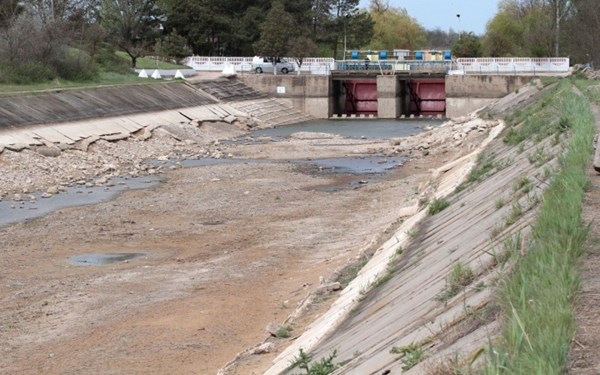Crimean authorities sound alarm about water shortage on peninsula
Igor Danilovich, director of government-owned facility company Voda Kryma (Water of Crimea), said that this year’s drought in Crimea exceeded all forecasts and there is very little water left in reservoirs that supply Simferopol.
"To date, the main sources of water supply to Simferopol are natural water reservoirs. These are Ayansk, Simferopol and Partizanskoye reservoirs. This is just for information. Today, with the projected volume of 36 million for Simferopol reservoir, there is only 4, 900 left. Partizanskoye - 34 million projected, 5 million cubic meters left. And in Ayansk, with 3,900 projected volume, there are only 300,000 cubic meters left," Danilovich said on Radio Krym.
Earlier, the head of Voda Kryma ,Vladimir Bazhenov said that authorities will start pumping 80,000 cubic meters of water per day from underground sources located west of Simferopol.
On November 2, it was reported that there are no large water reserves around Simferopol to satisfy the water shortage, so the authorities are "preparing for the worst". According to the forecasts of the Russian head of Crimea Sergey Aksenov, the scheduled delivery of water to the population will remain for at least another year.
Russian Deputy Prime Minister Marat Khusnullin, appointed by the Kremlin as "overseer" for Crimea, explained the lack of water on the peninsula by "theft".
Ukraine used to provide up to 85% of Crimea's fresh water through the North-Crimean Canal, which connects the Dnieper River with the peninsula. After Russia's annexation of Crimea in 2014, water supplies to the peninsula were cut off.
Water reserves in Crimea are replenished from reservoirs of natural runoff and underground sources. According to ecologists, the excessive use of water from natural sources has led to the salinization of the soil on the peninsula. Crimean authorities regularly call on the residents of the peninsula to save water.
The Permanent Mission of the President of Ukraine in Crimea reported that the supply of water to Russia-annexed Crimea and Sevastopol via the North Crimean Canal is possible only after the “de-occupation of the peninsula”.
